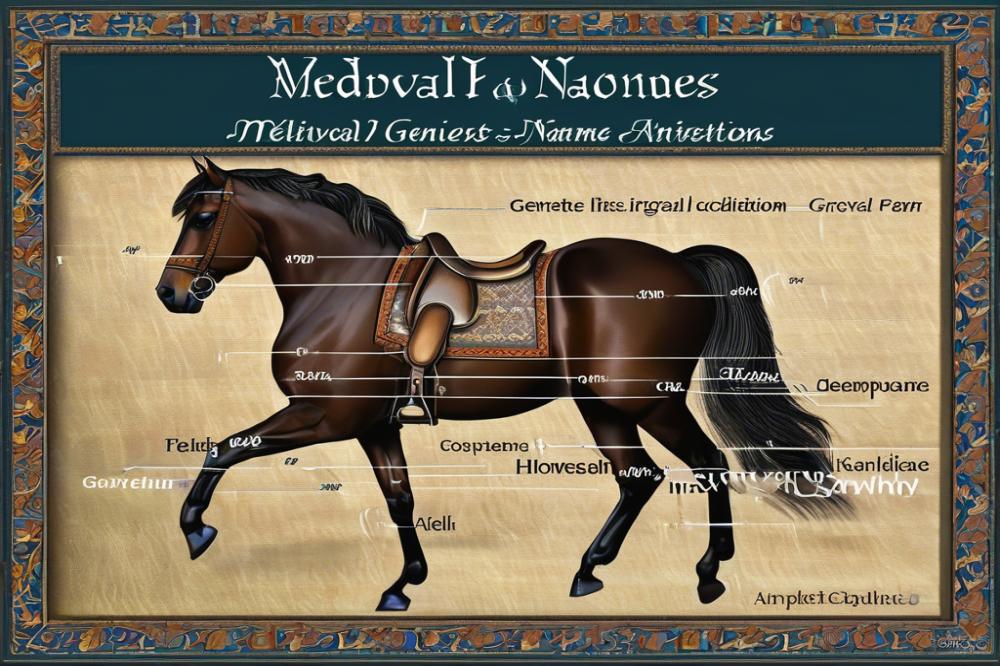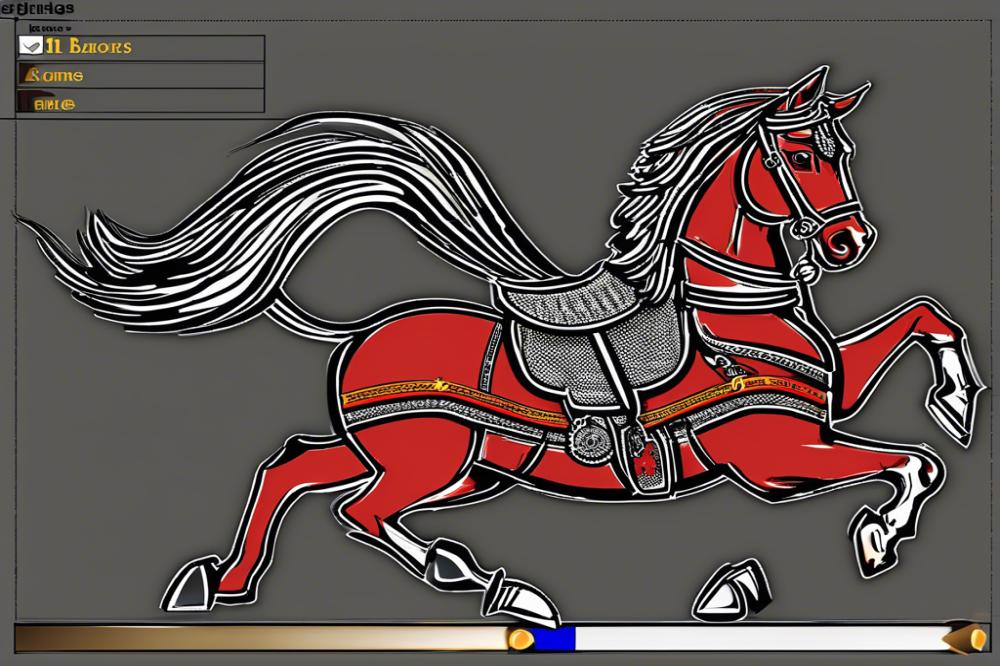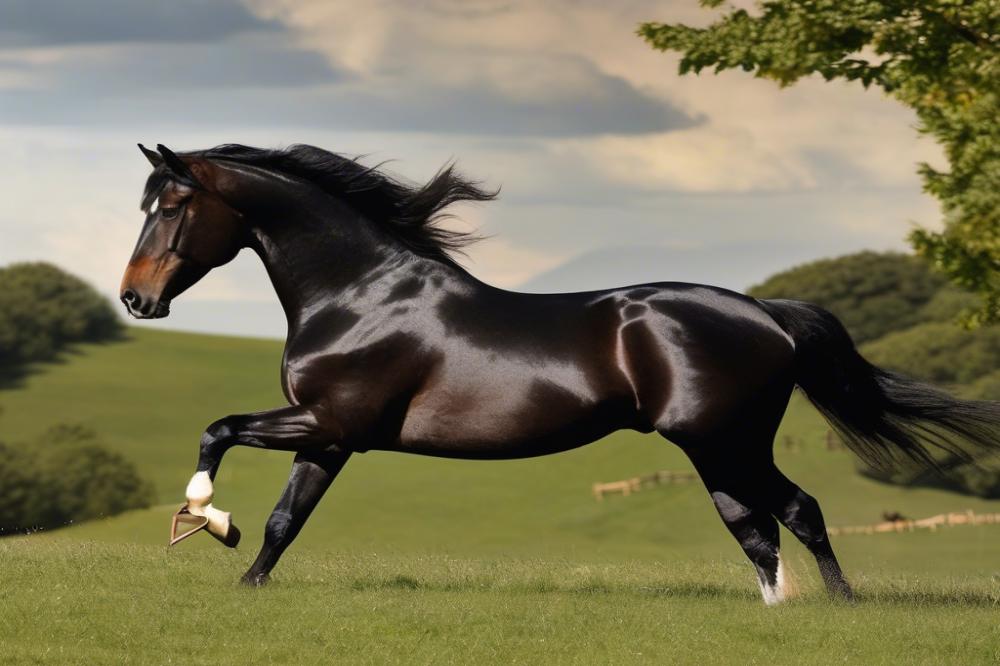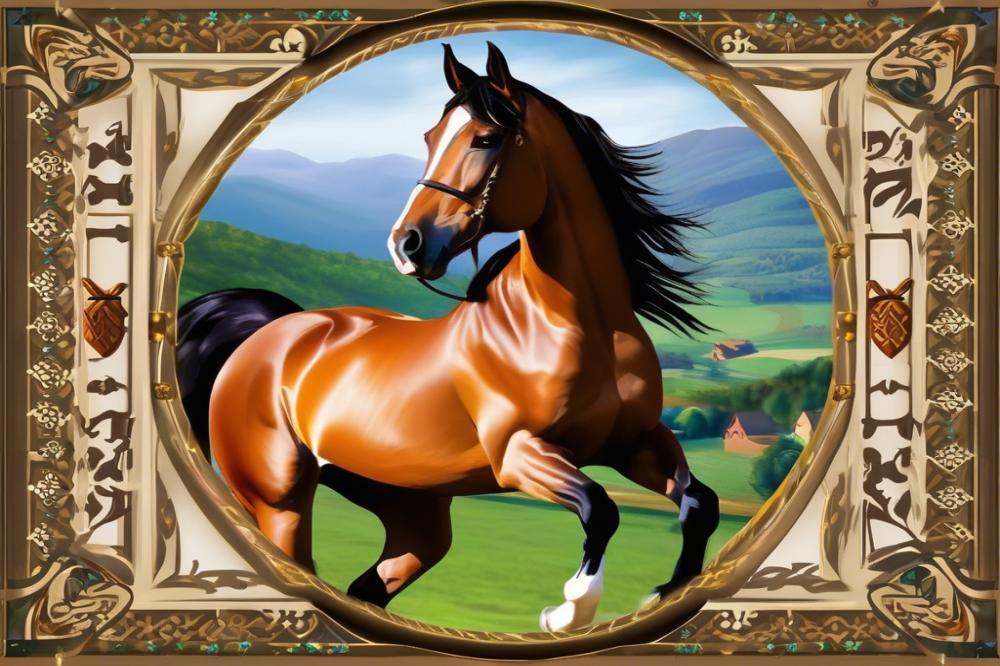The Vital Role of Horses in Medieval Life
Horses played a truly vital role in medieval society, acting as more than just modes of transportation. They were symbols of status, companionship, and power. Imagine a knight preparing for battle, donning his armor while his steed waits, strong and noble. This bond between rider and horse was essential in a world where the horse was often one’s greatest ally in both battle and daily endeavors. From the gallant steeds ridden into war to the sturdy ponies used for everyday tasks, these animals were the unsung heroes of their time, enabling people’s survival in a world brimming with challenges.
Purpose of This Article

In this article, we’ll dive into the fascinating and often whimsical world of equine names. Hop on as we explore horse names ideas, touching on historical horse names that reflect the culture and society of the medieval era. Ever wonder how horse identification worked back then? Or how a well-chosen name could elevate a horse’s status from mere work animal to a cherished companion? We’ll address all of these questions while sprinkling in some fun anecdotes and tidbits along the way.
The next sections will provide several tips and tricks related to horse care, particularly how names can elevate your understanding of a horse’s identity and personality. Did you know that specific names often indicate breed traits, such as the best war horse breeds that were especially revered for their strength and loyalty? So, whether you’re looking to name your new companion or just want to learn about the vast array of equine names, you’re in the right place. And yes, there might even be a humorous story or two about adults riding ponies! Buckle up; this is going to be a ride to remember!
Historical Context

The Role of Horses in Medieval Life
Horses held a vital place in the medieval world. They were not just companions; they were essential for daily activities. The average peasant relied on a sturdy steed for farming. Nobles, on the other hand, had a whole stable full of horses. Each horse served a purpose, making them part of the community.
Horse naming was important as a way to show a horse’s character or role. Names often reflected lineage or traits, like “Swift” for a speedy horse or “Braveheart” for a courageous steed. Such names provided a sense of identity for both horse and owner. In many ways, these historical horse names connected lovers of equines with their heritage.
Different Types of Horses and Their Uses
There were several types of horses during medieval times. Draft horses were hefty beasts, perfect for plowing fields. They were built for strength, not speed. Riding horses, such as the noble destrier, were bred for battle. Those animals needed agility and stamina, qualities crucial in the chaos of war.
Moreover, ponies were common among commoners for riding and tasks. They might not have the size of a warhorse, but they were reliable. In packed markets, people often depended on them to transport goods. Fitting the right horse to the right task was crucial for success.
Importance in Warfare, Agriculture, and Transportation
In warfare, horses were game-changers. Knights fought on horseback, charging into battle with their trusty mounts under them. Victory often hinged on the strength and training of these animals. Leaders understood that a well-cared-for horse meant a better chance of winning.
On the other hand, agriculture relied heavily on these creatures. Horses pulled plows, carried loads, and aided in farming tasks. Without them, the fields would struggle to provide food. Transportation also depended on horses for getting around. People commuted to markets or traveled on errands, relying on their noble steeds.
In medieval society, a horse was more than an animal; it was a tool for survival and a symbol of status. Horse care, identification, and the right equine names became part of daily life. From farmers to nobles, everyone had their own horse names ideas reflecting their needs. Surely, every role counted, whether big or small.
Types of Medieval Horses

The medieval period brought many kinds of horses, each suited for different tasks. These animals played vital roles in battle, farm work, and transport. Let’s explore some of the main types.
Warhorses
First on our list are warhorses. These magnificent creatures were specifically trained for battle. They had strength, speed, and courage to carry knights into the fray. A popular breed was the destrier. Known for their power, destriers were favorite selections among noblemen. Horse naming in this context often reflected their valor, with names like “Thunderhead” or “Braveheart.”
Draft Horses
Next up, we have draft horses. These larger horses were the workhorses of the medieval world. Farmers used them to pull plows and heavy carts. Breeds such as the Clydesdale and Shire were favored for their strength. With their powerful builds, they made light work of tough tasks. Imagine one of these guys plowing a field! Horse care for draft breeds needed attention too, as they required a high-quality diet to maintain their strength.
Riding Horses
Not all horses were tough enough for battle or farm work. Riding horses were bred for speed and agility. The Palfrey was a well-known type that ladies often rode. Gentle in nature, they were perfect for leisurely journeys. Riders could enjoy a trot through the countryside on these graceful animals. For horse identification, riding horses often bore elegant, slender bodies. Names ideas for these lovely creatures included “Silverwind” or “Whisper.”
Ponies
Ponies also played an important part in medieval life. While smaller, they were hardy and strong for their size. Children often rode ponies, allowing them to learn riding skills from an early age. Breeds like the Welsh Pony had friendly temperaments, making them great companions. Those involved in horse naming might choose playful names such as “Pip” or “Muffin” for these feisty little steeds.
Specific Breeds and Their Characteristics
Every breed had its quirks. A destrier was not only strong but also fiercely loyal. Meanwhile, a Clydesdale could pull heavy burdens but would not win any races. Riding horses had their elegance, while ponies offered a gentler riding experience. It’s fascinating how even back in medieval times, people understood the importance of selecting the right horse for the right job. Choosing the right equine names often reflected the horse’s personality and strengths.
From powerful warhorses to nimble riding horses, there was a place for every horse in medieval society. Understanding the different types of horses and their unique traits can bring history alive. Next time you see a horse, think about all the roles they’ve played throughout history!
Naming Conventions
Common Practices in Naming Horses
Naming horses in medieval times was not just about choosing a name. It often reflected the horse’s appearance, skills, or lineage. For instance, a horse with a glossy black coat might be called “Shadow” or “Jet.” A strong warhorse might be named “Braveheart” for its courage in battle. Some names were taken from nature, like “Thunder” for a fast runner, while others referred to famous people or events. Horse care was heavily tied to how a horse was named, as a name could affect the bond between horse and rider.
Cultural Influences on Names
Various cultures influenced equine names throughout the medieval period. In England, names often had Old English roots, while French knights had names that reflected their heroic deeds. The presence of knights and nobility meant that names often indicated status. Nobles preferred grand titles, while peasants chose simpler names. Additionally, religion played a role. Names like “Saint George” were not uncommon, as they invoked protection and valor. With so many cultural influences, medieval horse naming was a rich tapestry of traditions and stories.
The Significance of a Horse’s Name
A horse’s name meant more than just identification. It could signal the horse’s purpose, whether for war, labor, or leisure. For instance, historical horse names often hinted at a horse’s special skills. A horse named “Windrunner” might be expected to excel in speed. These names created a sense of pride and ownership. People tended to feel a deeper connection to their horse if they believed the name captured its essence. Choosing the right name was vital, as it was a nod to the horse’s character and capabilities.
Finding the right name can be a fun exercise too. One might come up with creative horse names ideas based on quirky traits. Does that friendly mare love to nibble? Maybe “Nibbler” is the ticket. Or perhaps that stubborn stallion could be dubbed “Mr. Grumpy.” Naming was an adventure, often filled with laughter and stories.
Famous Medieval Horses
Throughout history, horses have played important roles in the lives of knights, nobles, and common folk alike. Some wild steeds became legends of their own right. These famous medieval horses not only won battles, but they also captured the imaginations of many.
Notable Horses from Historical Records and Literature
One of the most well-known equine figures is Bucephalus, the beloved horse of Alexander the Great. This magnificent creature was famous for his bravery and loyalty. He followed his master into countless battles. Then there is the noble horse named Marengo, who carried Napoleon Bonaparte. Marengo was known for his speed and endurance. His name even became synonymous with power in the eyes of the French people.
Another standout is the horse named Griseldis from the medieval tale of Griselda. Although not as famous as some others, this horse represents loyalty and strength in literature. Stories like these gave rise to a range of horse naming possibilities in the Middle Ages.
Legends and Tales Surrounding Specific Horses
Stories about these remarkable animals often come with a flair for the dramatic. Many knights believed that their horses could sense danger. This belief led to tales of supernatural connections between men and their steeds. A notable example is the legendary Arthurian horse, Llamrei. According to the stories, this horse was incredibly loyal to King Arthur and played a key role in his adventures.
Then there’s the story of the legendary horse, Pegasus. This winged horse is well-known in Greek mythology, but the tales of his bravery and magic crossed into medieval literature. His very name conjures images of adventure, flight, and freedom. It’s no surprise his story inspired many horse names ideas during that time.
Impact of These Horses on Medieval Culture
The presence of famous horses had a lasting impact on culture during medieval times. People began to recognize the importance of horse care and identification. It wasn’t just about having a mount for battle. Horses became status symbols. The better the horse, the higher the status of its owner. Names often reflected qualities like speed, strength, or beauty.
In addition, tales of brave steeds encouraged people to create unique equine names. They would weave together descriptive elements to make names like Thunderbolt or Shadowfax. Such creativity in horse naming helped forge a bond between humans and their animal companions. Enchanted by these stories, people would share tales around the fire, lengthening their nights with history, humor, and camaraderie.
Clearly, notable horses left a mark on medieval culture. They inspired not just stories but also the hearts of those who heard them. Their legacies live on, reminding us of the power of loyal companions in our adventures.
Sources of Inspiration for Names
Common Themes and Sources for Medieval Horse Names
Choosing names for horses can be a fun adventure. Various sources can spark ideas, leading to a truly magnificent name. Many people turn to nature for inspiration. The beauty of the forest, the power of the rivers, or the majesty of mountains can all play a role. For instance, a horse might be named “Stormy” if it has a wild spirit, reflecting the fierce storms that sometimes roll in.
Mythology also serves as a rich well of names. People often picked names from legends. Think of “Pegasus,” the mythical winged horse from Greek tales. Such names add flair and stories behind them. Historical figures offer another dimension. Names like “Cromwell” or “Eleanor” could be used to honor brave rulers of the past. Each name carries its own legacy, creating a connection between horse and history.
Personal traits of the horse might inspire horse naming too. If a horse is comical, “Jester” could fit. On the other hand, a strong and regal horse might be better suited to a name like “Titan.” The personality shines through in the name chosen, making it not just a label but a reflection of the horse’s character.
Example Names and Their Meanings
Various names stand out in the world of equine names. “Shadow” might be perfect for a dark-haired horse that quietly follows its owner. Then there’s “Bella,” translating to beautiful in Italian—ideal for a lovely mare. Nature-inspired names work like magic because they connect to the world around us. A horse named “Willow” could evoke thoughts of grace and flexibility.
Historical horse names can be both bold and meaningful. “Gareth” could honor Sir Gareth from Arthurian legends, linking the horse to nobility. Another interesting choice might be “Morrigan,” inspired by the enchanting figure in Celtic mythology known for her wisdom and power. One could imagine a spirited stallion galloping across a field, embodying strength.
As we navigate the fun of horse care and horse identification, creativity often leads the way. Don’t underestimate the charm of a simple name that holds deeper meaning. Names like “Braveheart” or “Clover” can evoke feelings and images, shaping how a horse is perceived. Horse name ideas come in all shapes and sizes. Choose wisely, and don’t shy away from those quirky names that make you smile.
Explore the joy in naming your equine companion. With countless sources of inspiration, the perfect name is waiting to be discovered. Whether it’s a nod to nature or a tribute to a legend, every name tells a story—a bond between horse and owner woven through time.
Evolving Perception of Horses
Throughout history, horses have sparked the imaginations of many. People have always seen these animals as more than just transportation. During the medieval period, horses were often named after traits or skills. It was common to see names that reflected their speed, strength, or even color. For instance, a horse might be called “Thunder” if it was particularly fast. The names served to highlight the horse’s characteristics in a way that everyone could understand.
How Horse Naming Has Changed Over Time
Over the centuries, horse naming has seen its fair share of changes. In earlier times, a name could command respect or even inspire fear. Today, many owners choose equine names based more on personality. An owner might name a horse “Bubbles” if that particular horse has a bubbly nature. This shift shows how relationships between horses and humans have grown deeper.
In addition, horse care now includes crafting a strong bond through naming. Many riders want a name that reflects not just the horse’s looks but also its spirit. This modern trend highlights companionship in the equine world. Owners look for horse names ideas that resonate with their personal stories or shared adventures. After all, a well-chosen name can strengthen connections.
The Legacy of Medieval Horse Names in Modern Equestrian Culture
Even today, traditional horse names still hold a place in our hearts. Historical horse names often find themselves mixed in with contemporary choices. Many riders appreciate the rich heritage behind names like “Knight” or “Gryphon.” Using these names can feel like carrying a piece of history. They remind us of past eras when horses played heroic roles in battles and tournaments.
Moreover, horse identification has become more essential in today’s equestrian culture. With many breeds and styles, a unique name can help distinguish one horse from another. Veterinary records, competitions, and breeding often rely on specific names. This adds a new layer to the importance of naming. Horses are not mere animals; they are individuals with their own identities.
Next time you hear a story about a noble steed, remember that those medieval names have not faded away. They linger on, influencing how we view our beloved equines. Whether you’re picking a name that reflects speed or spirit, each choice carries weight. So, what will you name your horse? The possibilities are endless, and the legacy is rich!
Wrapping Up: The Legacy of Horses in the Middle Ages
Throughout our journey into the realm of medieval horse names, we’ve encountered a tapestry of rich histories woven with threads of culture, necessity, and camaraderie between humans and horses. From mighty steeds known for their valor in battle to gentle farmhorses that tirelessly toiled in the fields, the names given to these majestic creatures reveal much more than just a label—they tell tales of loyalty, strength, and companionship.
It’s fascinating to think about how horses shaped life during the Middle Ages. With every buck and trot, they became vital to society. Farmers depended on them, knights rode them into battle, and poets admired them in verse. Aren’t you curious about how much the bond between humans and horses has evolved? It’s a relationship that goes beyond the surface; many wonder, do horses understand humans? Their ears perk up and swivel at the slightest sound, leaving us to ponder the depth of their own understanding.
The names we’ve discussed carry an enduring legacy. They reflect values, traditions, and even the whims of the era. Just imagine a bard reciting tales of “Shadowfax” racing through the night or “Galahad” leading the charge in search of glory. Names like these evoke an image, stirring the imagination much like a painter splashing colors onto a canvas to capture a fleeting moment in time.
So, what can we take from our exploration? As we rediscover the significance of these unique names, let’s not forget to appreciate how every horse has its own personality. And speaking of personalities, remember that horse ear meaning is quite telling. The way a horse positions its ears can say a thousand words about its mood or intentions. We should learn to read those signs, don’t you think?
If you find yourself intrigued by this enchanting world, why not explore further? The medieval period is bursting at the seams with stories, and horses certainly played unforgettable roles in them. You might just uncover a new favorite tale about a forgotten hero or a whimsical character that makes you chuckle. There’s a whole world waiting to be discovered, and the adventures of these noble creatures are just the beginning of an epic journey into history.



